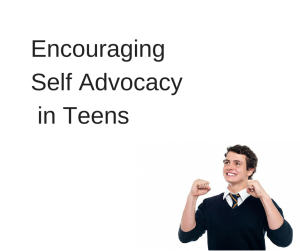
During their younger years, it is the parents responsibility to speak up for his or her child to get their needs met at school. However, as therapist Louise Levine writes,
“Doing everything for your children may make you feel like a successful parent but it may not let your child be a successful person.”
“Before children leave the protective shelter of home and zealous parenting, we need to help them practice basic techniques and instill competencies that will enable them to:
Feel comfortable conversing about their disability,…
Identify their warning signs,…
Advocate for themselves,…
(Have systems in place that)… will help them…manage their lives, and
Have a sense of humor about ADHD….and their own particular foibles.” (1)
For all children, the ability to view the future with hope is central to their future success. According to the Gallup Student Poll, hope, engagement and well-being are all factors that have been shown to drive students’ grades, achievement scores, retention, and future employment. (2) For students with ADHD, knowing that they have areas of competence and strengths that can help them overcome their difficulties gives them hope.
Realizing that many of your weaknesses are not personal but symptomatic of the disorder and exploring strategies to address specific problem areas provides a sense of power and competence they may not have felt before. Knowing that asking for help is often met positively builds social trust. Being skilled in requesting options to standard requirements at school can also help students to re-engage with learning. The ability to affect their environment and how people react to them increases self-esteem and, in turn, affects their sense of well-being.
For those with ADHD, knowing there are ways around your difficulties that don’t involve constant struggle is truly liberating.
We have found a few strength assessments and self-advocacy programs that can help your teen through this process.
Evaluate Strengths
FREE – VIA Strength Survey for Children (VIA stands for Values in Action) Measures 24 Character Strengths for Children – Well researched
FREE – Interest Profiler – Discover what your interests are and how they relate to the world of work. The Interest Profiler helps you decide what kinds of occupations and jobs you might want to explore based on your interests.
 $ – The Strengths Explorer For Ages 10 – 14 – Package includes: Downloads for Youth workbook, a parent guide, a teachers guide, and one online access code. ($10 for code)
$ – The Strengths Explorer For Ages 10 – 14 – Package includes: Downloads for Youth workbook, a parent guide, a teachers guide, and one online access code. ($10 for code)
Self-advocacy for ADHD: Know Yourself On-line resources for identifying learning styles and personal strengths as well as exploring interests. Know why your personal style is important. Pursue self-evaluation as well as talking with friends, parents, and teachers about what they perceive as your strong points.
EBook
BUILDING A BRIDGE From School To Adult Life – A Handbook for Students and Family Members to Help with Preparation for Life After High School (92 page Workbook – Includes strengths and interests survey as well as self-advocacy tips)
Stepping Forward: A Self-advocacy guide for middle and high school students – 68 pages
1) Kids with ADHD are Natural Born Leaders by Louise Levin, Marriage and Family therapist – SmartKidswithLD.org – http://www.smartkidswithld.org/getting-help/adhd/kids-adhd-natural-born-leaders/ (Link works) – Harvested March 19, 2015 (Copy and paste URL to link to article)
2) Gallup Student Poll – Hope, Engagement, and Wellbeing http://www.gallupstudentpoll.com/home.aspx – Harvested March 19, 2015
“Image courtesy of stockimages/FreeDigitalPhoto.net” Modified on Canva.com
Follow ADHD – ADD’s board For and about Teens with ADHD on Pinterest.
Follow ADHD – ADD’s board Transition – to work or college on Pinterest.
Follow ADHD – ADD’s board College and High School Strategies on Pinterest.


